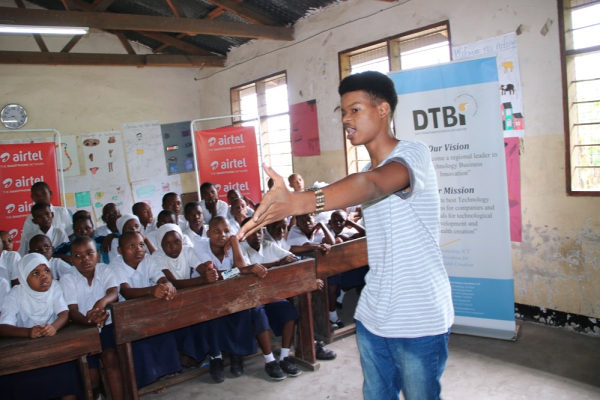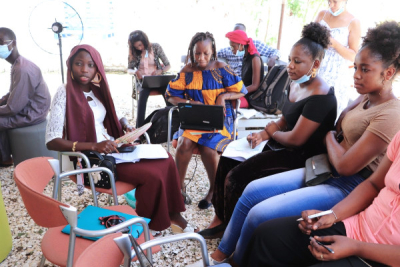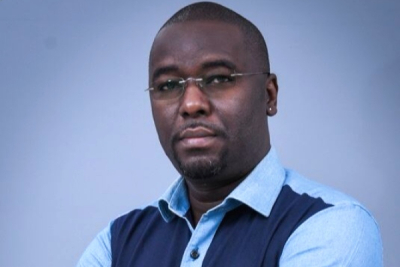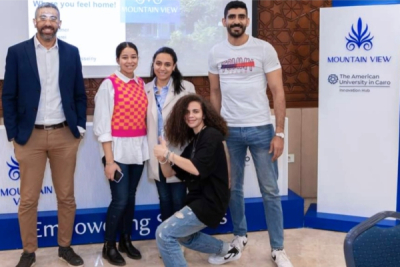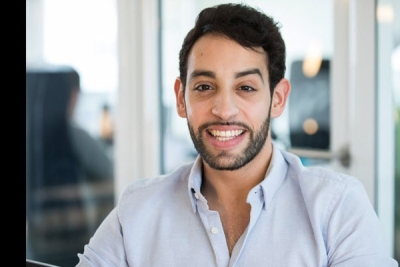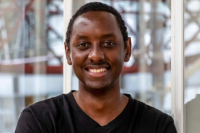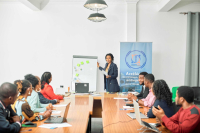
TECH STARS (1007)
In an ever-changing entrepreneurial environment, Tanzania's Dar Teknohama Business Incubator stands out for its commitment to supporting and promoting the most promising technological initiatives.
The Dar Teknohama Business Incubator (DTBi), established in 2011 by the Tanzanian Commission for Science and Technology (COSTECH) in collaboration with InfoDev, a World Bank program, is a hub for technology startups. Under the guidance of CEO George Mulamula, it is dedicated to fostering innovation and supporting entrepreneurs in Tanzania.
DTBi is focused on promoting the growth of emerging companies in the information and communication technology sector and innovative startups and individuals. The goal is to stimulate job creation and bolster the national economy. With the ambition to be the central hub for technology startups, DTBi actively identifies and delivers value-added services essential for the success of its clients, thereby contributing to their growth and market success.
The incubator provides a wide array of business development services designed to enhance the market survival chances of early-stage ICT startups. These services encompass access to shared resources, assistance in securing financing and market access, credible support, strategic advice, and robust business management. Furthermore, DTBi encourages the formation of professional networks to keep abreast of technical trends and seize market access opportunities, thereby creating a conducive environment for business growth and success.
DTBi provides workspaces and coworking spaces to encourage collaboration. It has implemented training and financial management programs. With the backing of telecom operators such as Tigo, Airtel, and the Tanzania Communications Regulatory Authority (TCRA), DTBi has achieved more than 38 innovations and 33 incubations. The incubator has generated over 659 direct jobs and more than 17,000 indirect jobs.
Melchior Koba
Driven by the vision of transforming recruitment practices, she spearheads Niajiri Platform Ltd., leveraging innovative technology to connect employers with top talent in the industry.
From connecting job seekers with opportunities to helping businesses run more efficiently, Lillian Secelela Madeje (photo) is a Tanzanian entrepreneur making waves in the tech and social impact space.
Driven by a passion for innovation and empowerment, Madeje founded Niajiri Platform Ltd. in 2018. This "workforce development tech platform" leverages machine learning and data analytics to equip individuals with job-ready skills and connect them with suitable opportunities. It also streamlines the recruitment process for employers, providing access to a network of talented professionals.
Niajiri Platform is just one facet of Madeje's entrepreneurial journey. She's also a founding board member of Tanzania Startup, fostering collaboration and support within the country's burgeoning startup ecosystem. Additionally, she sits on the board of Jumo Tanzania, a fintech company expanding financial access in emerging markets across Africa and Asia.
Beyond technological pursuits, the entrepreneur also spearheads Ekihya, a management consultancy offering tailored solutions to help Tanzanian organizations optimize their operations. Her passion for development extends beyond business. Madeje actively contributes to social impact initiatives, as evidenced by her qualitative research work on financial inclusion with IDEO.org.
Madeje's dedication to innovation and community impact has garnered recognition. She is the recipient of the 2019 Marlowe Sherwood Memorial Award from Park University, USA, and holds a Master's in Business Administration from African Leadership University's School of Business.
Melchior Koba
Operating across a network of five incubators in Senegal and The Gambia, Teranga Tech Incub provides young entrepreneurs with equipped workspaces, programs, and events to help them innovate and succeed.
Teranga Tech Incub, a network of five incubators in Senegal and The Gambia, is backed by the French Embassy and aims to promote and support youth entrepreneurship, particularly in the digital sector.
The network offers two main services through its incubators in Dakar, Saint-Louis, Kaolack, Ziguinchor, and Banjul. The first is a six-month mentoring program supporting around 70 projects per year across two cohorts per incubator. This program helps entrepreneurs structure their projects.
Secondly, the network organizes events promoting innovation and entrepreneurship, including events hosted by other organizations lacking a presence in Senegal or Gambia.
Teranga Tech Incub also provides equipped and connected workspaces, collaborative areas, and expert networks to strengthen the ecosystem. They hold awareness sessions on entrepreneurship and organize events featuring experts in various sectors like blue economy, agritech, and audiovisual.
Examples of supported companies include online store platform Boutique Sénégal, Web3 specialist Kucibok, and maritime safety solutions provider O'Connect.
To achieve its mission, the network has partnered with organizations like Polaris Asso, Concree, Jokkolabs, and Simplon.
Melchior Koba
In a career spanning several years, he has worked at major corporations including Ericsson, Oracle, and Microsoft in the United States. In 2021, he established his startup, setting up an automated distribution network that seamlessly integrates banking services, mobile money solutions, and fintech offerings.
Mika Diol (photo), a seasoned systems engineer from Senegal, boasts an impressive array of technical certifications from industry giants such as Microsoft and Dell. As the co-founder and CEO of Outsource Monetic Group, a US-based fintech startup with a strong foothold in Africa, Diol is at the forefront of transforming financial services accessibility across French-speaking West and Central Africa.
Founded by Mika Diol and Ibrahima Diedhiou, Outsource Monetic Group has set its sights on revolutionizing financial inclusion. Their mission? To empower communities by bridging the gap between traditional banking services and the dynamic digital landscape. With a keen focus on French-speaking regions, the startup aims to democratize access to financial tools.
At the heart of their innovation lies KaliSpot, a cutting-edge multi-vendor ATM solution. These smart devices seamlessly integrate banking services, mobile money platforms, and fintech offerings. Operating via a robust 3G connection, KaliSpot devices adapt to users’ needs, recognizing their service providers and tailoring the experience accordingly. Gone are the days of interminable queues outside brick-and-mortar banks; KaliSpot promises efficiency and convenience.
In 2023, Mika Diol shared his vision for the future. “Fintechs will soon realize that the lack of physical infrastructure poses a significant hurdle in conquering these young and promising markets,” he asserted. By leveraging technology, Outsource Monetic Group aims to empower individuals, businesses, and entrepreneurs across the region.
Before launching Outsource Monetic Group, Diol’s career trajectory was marked by notable milestones. In 2006, he assumed the role of Country Manager at the Ivorian digital services company N-SOCITECH. Subsequently, he joined Ericsson in the USA as a Project Manager in 2007. His tenure at Microsoft saw him lead service sales, while Oracle appointed him Territory Sales Manager in 2014. A year earlier, he joined the Senegalese IT firm Servitech Group as Sales and Marketing Director.
Melchior Koba
Bridging the gap between industry and academia, the incubator has emerged as a catalyst for research, hands-on learning, and entrepreneurial ventures.
The AUC Innovation Hub (AUC iHub), an initiative of the American University in Cairo (AUC), serves as a bridge between industry and academia to foster innovation. It facilitates industrial collaborations, interdisciplinary research, and hands-on learning, creating an environment conducive to the emergence of new ideas and technologies.
The iHub provides industrial partners with privileged access to the innovative perspectives of AUC faculty members and talented students, allowing the industry to shape and leverage university research for the development and validation of products and services. This collaboration opens up new avenues for innovation.
Through internships and in-class projects, AUC's creative and enterprising students engage with industry pioneers, addressing real-world business challenges. Additionally, the hub facilitates collaborations between academia and industry to transform research outcomes into marketable innovations and new technologies, meeting the evolving needs and desires of global consumers.
AUC alumni seeking to establish their businesses are given priority access as iHub members, connecting them with an international network of companies, start-ups, experienced AUC faculty, and a pool of student talent, providing a fertile ground for growth and innovation.
The iHub also organizes collaborative event series such as Innovation in Action, with an upcoming conference featuring a leading figure in fintech. Furthermore, it has launched initiatives like the Design Thinking Challenge and the Innovation Sprint in partnership with various organizations, fostering a culture of innovation and entrepreneurship.
The AUC Innovation Hub's efforts align with the Reuters style, providing a clear and objective overview of its activities and initiatives.
Melchior Koba
A Moroccan entrepreneur specializing in technology, he brings a unique perspective on the movement of people through his company Seiki. By providing accurate data and in-depth analysis, he offers valuable insights for decision-making across various sectors.
Jaafar Elalamy (photo) is a Moroccan serial entrepreneur who specializes in technology. He is the co-founder and CEO of Seiki, a company that specializes in mobility intelligence. Seiki was founded in France in 2022 and is a subsidiary of LaTour Media Group (LMG), a communications company with operations in France, Belgium, Italy, and the UK.
Through Seiki, a mobility intelligence company based in France, Elalamy addresses the challenge of accurately predicting movement: "Knowing who moves, where, when, and why is crucial for many industries, but remains difficult to assess," he noted in 2023.
The platform analyzes mobility data to inform strategic decisions for retailers, transport agencies, businesses, and others. Its services range from optimizing network expansion to designing smart cities by forecasting population movement. It also reports congestion rates and establishes mobility profiles.
Before his venture with Seiki, Elalamy joined the LTMG Group in 2019 as a member of the Executive Committee. He held multiple roles within the group, including CTO, CMO, and CIO of Adriver, the group’s media agency.
Prior to joining the group, he co-founded three companies: PeersUp, a technology solution that helps human resources managers simplify access to information for their teams; Street4Fit, a company that organizes sports sessions for major groups and start-ups; and Bonapart, a company that connects homeowners with tenants.
His academic credentials include a master’s degree in computer science and data science from Compiègne University of Technology (2016) and a master’s degree in entrepreneurial studies from HEC Paris (2017). His professional career kicked off in 2012 at Hermès as an engineering intern. He later joined Référence One, a marketing and communications consultancy, as an assistant to the director in Morocco in 2014. His experience also includes a stint as a trainee software engineer at Siemens (2015) and a role as an innovation manager and data science trainee at Amadeus IT Group.
In 2020, Forbes France named Elalamy one of the 30 personalities under 30 who made an impact in entrepreneurship/innovation. In 2023, he was named by the magazine Ceux qui font l'Afrique as one of the under-30 individuals leaving an international impact in Africa.
Melchior Koba
Nestled in the heart of Pretoria, South Africa, Botlhale Village is carving a niche as a leading center for innovation and progress in the information and communication technology (ICT) sector.
Botlhale Village, an initiative of Belgium Campus, serves as a knowledge creation and sharing hub focused on advancing information and communication technologies in South Africa. It operates as an incubator where research students collaborate with startups, leading to the emergence of new projects and the creation of startups, thereby enhancing the knowledge and systems developed within the center.
The village offers various services, including customized software development and an internship program that provides specialized assistance to South African companies. Its incubator provides support, mentoring, and resources to startups, offering office space, access to funding opportunities, assistance with business planning, and networking events.
Furthermore, students at Botlhale Village organize conferences to showcase their academic achievements and innovative projects, attracting a diverse audience. These events serve as a platform for idea exchange, fostering collaborations, and exploring growth and partnership opportunities.
In addition to the Belgium Campus, Botlhale Village is supported by several other institutions and companies, including Ericsson, Altron Healthtech, Vodacom, and Cape Town Creative Academy. The research conducted at this innovation and incubation hub aims to serve citizens' needs in terms of learning and teaching.
Melchior Koba
Leveraging his background in electrical engineering, the entrepreneur focuses on developing technology with a significant social impact. Through his educational technology company, he equips users with the skills and support needed to thrive in the job market.
Allan Mushabe, a Ugandan entrepreneur based in South Africa, is gaining attention in the edtech sector with his startup, Lightbulb EdTech. Established in 2015, the company seeks to bridge the gap between education and employment by equipping its users, ranging from corporate entities to educational institutions, with the skills and support needed to secure sustainable job opportunities.
Lightbulb EdTech's platform is a managed, personalized, mobile, and cloud-based learning management system that offers online access to expert resources. Currently, the platform has over 30,000 active users and creates and manages engaging virtual learning environments tailored to the specific needs of its users.
In addition to his role at Lightbulb EdTech, Mushabe has served as the Director of Vargatex since 2012. Vargatex is a company that develops and manages the deployment of turnkey information and communication technology (ICT) solutions for businesses and educational establishments. Their services include software development, business process optimization, and the procurement, configuration, and deployment of ICT hardware.
Mushabe's journey into the tech industry commenced after he obtained a Master’s degree in Electrical Engineering from the University of Cape Town in 2009. He began his career as a technical product developer at Telkom and later worked as a business development consultant at Internet Solutions in 2011.
Melchior Koba
Through FindMe, his digital solution, he simplifies the identification and precise location of homes, company headquarters and points of sale. He has received several awards, including the Forbes Africa "Startup of the Year" prize.
Brandon Wanguep (photo), co-founder and CEO of FindMe, is tackling the challenge of inefficient addressing systems in Africa through a mobile app that generates standardized postal addresses. Born in Cameroon, his solution is currently based in Dakar with plans for expansion across other African capitals.
Established in 2020 by Wanguep, Romaric Takam, Hyacinthe Sambou, and Duplex Eric Kamgang, FindMe was created to address the challenge of locating addresses in Africa. The application aids in identifying and geolocating residences, business headquarters, and sales points.
Wanguep, recounting the experiences that led to the creation of FindMe in January 2024, said, "One of my friends lived through an ordeal during a trip to Congo, spending more than 45 minutes looking for the Cameroonian embassy with Google Maps. I met a friend who lost her father because the ambulance couldn’t find her home in time, despite all the directions provided. I wanted to create an innovative project that would have a major and positive impact on society."
Between 2020 and 2021, Wanguep, an entrepreneur at Schoolab and STATION F, received numerous awards and recognitions for FindMe. He won the Dakar Innovation Days 2023 Hackathon and was listed in Forbes Africa's Top 30 under 30. On December 14, 2023, he was awarded the Forbes Africa "Startup of the Year."
Wanguep holds a Master 1 in Mechanical Design and Structural Calculations from the Ecole Nationale Supérieure Polytechnique de Douala (2017), a Master's degree in Materials Science and Engineering from Mines Paris (2019), and a diploma in Entrepreneurship and Innovation from PSL University in Paris (2021).
He began his professional journey in 2018 as an assistant engineer at the Materials Center of Mines Paris. In 2019, he served as an R&D assistant engineer at GE Renewable Energy in France.
Melchior Koba
i-kiotahub is a key player in the Democratic Republic of Congo's entrepreneurial ecosystem. It provides critical support to high-growth businesses, offering a comprehensive suite of services, including technical assistance, managerial guidance, and access to a collaborative co-working space.
i-kiotahub, a Congolese business incubator linked to the Scientific Research and Expertise Center (CRES), is providing support to companies with high growth potential, aiming to create job opportunities for young people.
Launched in 2022, i-kiotahub offers technical and managerial services to businesses in both low-tech (agriculture, mining, manufacturing) and high-tech (agritech, edtech, fintech) sectors. The incubator helps companies improve market performance and secure financing.
"Our goal is to create job opportunities for young people and contribute to the entrepreneurial ecosystem," said Rekha Kasienene, promoter of the incubator and a civil affairs specialist with the United Nations Organization Stabilization Mission in the Democratic Republic of Congo.
i-kiotahub also provides a co-working space equipped with high-speed internet, offices, a meeting room, a library, and a brainstorming area. This space fosters collaboration and networking among entrepreneurs.
The incubator helps companies streamline operations, modernize management, and prepare for investment and expansion. It also aims to unlock access to capital for Congolese companies with innovative and sustainable projects.
Overall, i-kiotahub promotes an open-minded approach to entrepreneurship, peace, and investment in the DRC.
Melchior Koba
More...
Through its incubation program, Standard Chartered Women in Technology promotes the inclusion of African women in entrepreneurship and technological innovation.
Standard Chartered Women in Technology Incubator, based in Kenya, supports women-led startups tackling challenges across the continent. The program champions diversity in technology and entrepreneurship, fostering opportunities for female founders.
Run in collaboration with Strathmore University's iBiz Africa center, the initiative offers comprehensive incubation encompassing immersive learning, mentorship, coaching, seed funding, and business-to-business partnerships. It targets high-potential startups focused on solving critical African issues.
The incubator selects female entrepreneurs developing tech startups or leveraging emerging technologies like IoT, AI, robotics, AR/VR, 3D/4D printing, big data, blockchain, and biometrics. Eligible companies must operate between three months and two years.
The program provides top-performing participants with nine months of post-incubation support for market launch and scaling. Launched in 2018, it has hosted six cohorts and incubated several successful tech companies. Examples include legal tech firm InstructKE, educational technology startup Know Learning Ltd, and Rhea Soil Health Management, aiding small-scale farmers with soil analysis and agricultural services.
Melchior Koba
An Ethiopian refugee in Uganda, he offers his skills to fellow refugees, providing IT and English language training to aid their integration.
Binyam Meles (photo), an Ethiopian entrepreneur and refugee in Uganda, is dedicated to using his IT skills to support his fellow refugees. A graduate of Addis Ababa University with a Bachelor's degree in Software Engineering, Meles founded Aspire Digital Hub in 2022, a center that leverages information technology to empower young people, refugees, and host communities in Uganda.
Aspire Digital Hub provides English and IT courses to help refugees overcome language and technical barriers, to eliminate illiteracy, idleness, and lack of opportunity. The hub also conducts workshops on personal development and mental health to assist refugees in recovering from trauma, addressing negative mindsets, and realizing their full potential.
Meles' professional journey began in 2018 as a web designer and developer for Need Nutritional Products and Services in Ethiopia. He then gained experience as a trainee software engineer at EthERNet and Ethiopian Airlines from 2018 to 2019. In 2020, he joined the German Agency for International Development Cooperation (GIZ) as a mentor for entrepreneurship and web development. Subsequently, in 2021, he worked as a web designer and developer for LeHem Nutrition Counseling. Upon arriving in Uganda in 2022, he took on the role of a digital literacy consultant for FLIP Africa, an organization that connects young people to short-term job opportunities.
As a member of The Amahoro Coalition, an African initiative that unites various players across the region, Meles continues to make significant contributions to the empowerment and development of refugees and young people in Uganda.
Melchior Koba
The tech expert provides ICT expertise to various companies. She holds board positions at multiple African firms and has garnered several awards and recognitions.
Ghanaian entrepreneur Ethel Cofie (photo), founder of Edel Technology Consulting, specializes in IT consulting across West Africa and Europe. She offers advice on technological growth in emerging markets. A graduate of Valley View University in Ghana (2005) with a Bachelor's in Computer Science, Cofie holds an MSc in Distribution Systems from the University of Brighton (2007) and an Executive Diploma in Leadership, Business, and Entrepreneurship from the Yale School of Management (2014).
Her firm, Edel Technology Consulting, offers software development, consulting, and training services. The company has completed projects in Ghana, Sierra Leone, Nigeria, and Gambia, with an experienced team. Cofie is also the founder of Women in Tech Africa, a group of women in technology across 30 African countries. She serves as the Chairperson of the ICT Sector Skills Council of the Commission for TVET Ghana, the country's skills regulator and promoter.
Cofie sits on the board of several companies, including Old Mutual Ghana, Worldreader, and Partech Technologies. She is a strategic advisor to the CEO of fintech KudiGo and a trustee of STAR Ghana Foundation. She has also received several awards and accolades, including being shortlisted for the United Nations GEM Tech award in 2014, being named as Africa's most influential businesswoman in the ICT sector by CEO Global in 2016, and being recognized as part of the Technology Excellence Award at the Glitz Africa Ghana Women of the Year Awards in 2020.
Melchior Koba
As a start-up incubator, Createam, through its incubation and pre-incubation programs, welcomes and supports entrepreneurs and companies in the fields of ICT, renewable energies, the environment, and agribusiness.
Founded in 2017, Createam is a Malian business incubator that supports and strengthens the performance of startups in various sectors, including information and communication technologies (ICT), renewable energies, the environment, and agribusiness.
Led by Managing Director Souleymane Drave, Createam offers accommodation, consulting, and networking services to help young companies navigate their early stages. It positions itself as a hub for identifying and accelerating promising Malian business talent.
Createam provides a range of programs and services tailored to different stages of a startup's journey. They include pre-incubation, a four-month program that helps project leaders validate their ideas, gather customer feedback, and refine their business models to ensure market fit. There is also an Incubation program that incubates existing companies already generating sales but facing growth challenges for up to three years. During that program, participants receive personalized support, including guidance on accounting, tax management, fundraising, networking, and partnership development. Createam also offers a shared workspace for entrepreneurs to collaborate and network.
Createam has supported several Malian startups, including e-commerce platform Sani-fere.com, online bus ticket booking platform Nextbus, web agency Cat Digital, and Suruku, a website offering discount vouchers to consumers.
The incubator’s mission is backed by several partners, including Orange Mali, Allianz Mali Assurances, Agence française de développement (AFD), Total Mali, Institut des hautes études en management (IHEM), Entreprendre Mali, Mercy Corps, and Diop Fall Associés.
Melchior Koba


